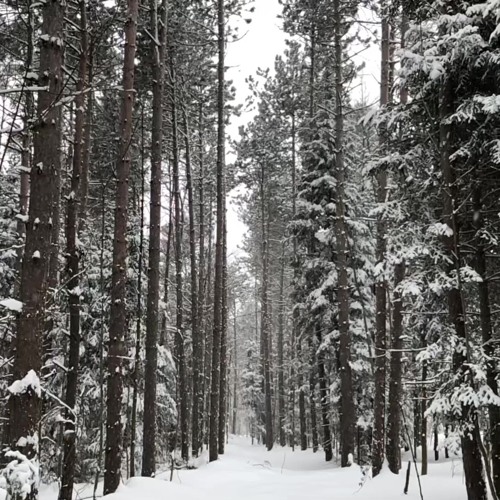Whose woods these are, I think I know. 1
His house is in the village, though; 2
He will not see me stopping here 3
To watch woods fill up with snow. 4
My little horse must think it queer 5
To stop without a farmhouse near 6
Between the woods and frozen lake, 7
The darkest evening of the year. 8
He gives his harness bells a shake 9
To ask if there is some mistake. 10
The only other sound’s the sweep 11
Of easy wind and downy flake. 12
The woods are lovely, dark, and deep, 13
But I have promised to keep, 14
And miles to go before I sleep, 15
And miles to go before I sleep. 16
Analysis
Line 1.
Line one begins with a question that catches the reader’s attention to wonder the same as the narrator. The narrator wonders about the owner of these woods, but upon closer look and imagination, he thinks he has an idea of the owner but does know the specific owner.
Line 2.
The narrator gives a clue that perhaps, out of all those people living in the nearby village, one of them might be the owner of those woods. The narrator gives a clue that there is a village, a civilization.
Line 3.
The narrator shows relief and freedom to trespass in someone’s woods because he won’t be seen. The narrator calms himself down and stops to hang around.
Line 4.
The narrator stops to admire nature. The line reveals an obsession the narrator has. The character resembles his weakness. He wants to admire how the woods fill with snow.
Line 5.
The narrator thinks his horse finds it abnormal that they must stop in the woods. In all the journeys the horse has accompanied the narrator, they have never been contained in the woods.
Line 6.
The lack of civilization within the woods makes the narrator think his horse finds no purpose in the narrator’s stop in the woods. The horse must have been used to stopping in farmhouses and villages.
Line 7.
The seventh line shows other reasons that made the narrator thinks his horse found it abnormal to stop by the woods. The line shows the danger that stopping by in such a worse environment and weather was unique to the horse.
Line 8.
By picturing the weather and evening time, for the narrator to describe it as dark could mean the clouds and snow-covered the sky, making it dark and hard to navigate. This predicts hardship and the horse’s insinuation that they must hurry into civilization.
Line 9.
The horse shakes his harness bells to remind the narrator of what they need to accomplish. The bell’s shake symbolizes a reminder that time is up and that the narrator should get on with his journey.
Line 10.
The horse thinks the narrator has made a mistake. It’s abnormal for them to stop and pay attention to distractions.
Line 11.
The narrator describes that he could hear a sweeping sound beside the bell. This symbolizes how their journey was lonely and how quiet the place was.
Line 12.
The forest is so quiet and lonely that the narrator can hear the sound of sweeping wind and falling snow. There is cold wind and snowflakes during winter, which in this stanza symbolizes the difficulties the narrator had to face to reconnect with nature.
Line 13.
The narrator shows the reader his obsession with the woods. The woods’ darkness, deepness, and quietness allure the narrator to spend more time admiring it.
Line 14.
This line shows that the narrator has come back to his senses. His mission is essential and overcomes his obstruction. He values his words and promises and will not let the lovely nature allure him to fulfill his promises.
Line 15.
The narrator shows he still has a long journey to cover, to fulfill his obligations, and dreams before he rests.
Line 16.
Line 16 is the narrator’s repetition to emphasize how long his journey is with the long-distance remaining for him to cover him to have no reason to spend more time in the woods.
Conclusion.
The poet deeply understood his mission and journey and portrayed this in his poetry. The horse symbolizes focus; the woods, snow, and beauty of nature symbolize obstructions and life’s difficulties; the journey symbolizes what one has to go through in their lifetime. Life’s length and sleep symbolize death. My interpretation of this poem is that although life has many challenges and obstructions that may allure one from their goals and dreams, remaining focused will lead one to achieve their goals and mission before death.

